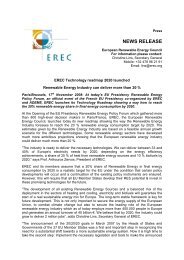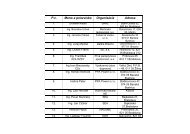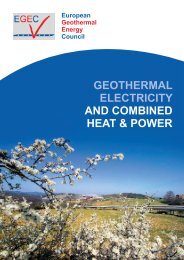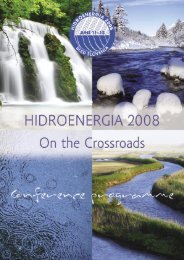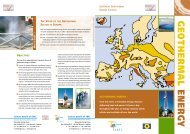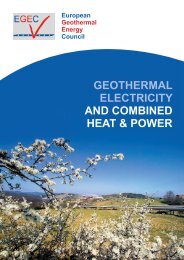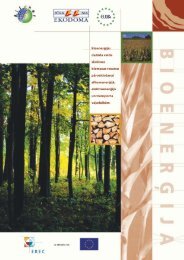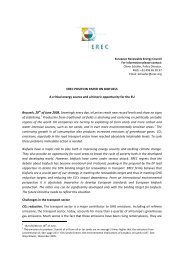CTO Assessment - European Commission
CTO Assessment - European Commission
CTO Assessment - European Commission
Create successful ePaper yourself
Turn your PDF publications into a flip-book with our unique Google optimized e-Paper software.
such as in the Region of Warmia,<br />
wood fuels represent a very important<br />
potential.<br />
Solid political decisions have in a few<br />
occasions been the catalyst for ambitious<br />
projects such as the “Fossil Fuel<br />
Free” of Växjö, where the municipality<br />
unanimously decided to stop using<br />
fossil fuels. A similar case was<br />
the Ingalina initiative (Sweden),<br />
where the regional administration set<br />
the objective to reduce the use of heavy<br />
fuel oil (mazout) and to start to use<br />
local fuel as biomass. Political will is<br />
also expressed through exemplary<br />
behaviours that can be used as a reference,<br />
such as the Paul Löbe Haus,<br />
which can be considered as an example<br />
of coherence in public action<br />
criteria regarding building, supporting<br />
the principle of preaching through<br />
examples. Processes of sustainable<br />
urban renovation supported by the<br />
administration are a different side of<br />
this dimension, as it is demonstrated<br />
by the Barcelona 2004 project.<br />
Environmental motivation is clearly<br />
identified in cases such as the Munich<br />
initiative, where the RE Partnership<br />
created involves the members<br />
of the already existing “Munich Ecology<br />
Alliance”, which included craftsmen’<br />
organisations, industry, NGOs,<br />
banks, administrative authorities, as<br />
well as the municipal utility company<br />
and the Munich Energy Agency. One<br />
of the key factors in Austria and Germany<br />
is also the opposition to nuclear<br />
power rising in the 80s from a majority<br />
of citizens, which helped to a large<br />
extent to prepare the ground of action<br />
for a local RES initiative. At<br />
Lüchow we see how the initiative<br />
arises from a growing debate concerning<br />
the possible building of a final<br />
disposal of nuclear waste in a small<br />
village of the district.<br />
The framework created through sustainable<br />
development plans and<br />
putting into practice local Agendas<br />
21 have been other important vectors<br />
towards new initiatives within <strong>CTO</strong>,<br />
as well as important vehicles for RES<br />
development in Europe. It is worth<br />
mentioning here the case of Ålborg,<br />
based on promoting environmental<br />
awareness since the initiative “Clean<br />
City - Green City”, the energy dimension<br />
of Isle of Wight’s<br />
Agenda 21, the longterm<br />
plan for energy sustainability<br />
on Götland,<br />
the Agenda 21 of Chieti,<br />
or the El Hierro 100%<br />
RES initiative, which<br />
based its programme on<br />
the planning strategy<br />
arisen from its declaration<br />
as a UNESCO Biosphere<br />
Reserve. These<br />
motivations are complementary<br />
to the initiatives seeking to<br />
redirect development models in crisis,<br />
such as the successful case of<br />
Varese Ligure with its Sustainable<br />
Project.<br />
Availability of technical reconversion<br />
or technological opportunities also<br />
played an important role. Several<br />
cases benefited from the fact that the<br />
traditional heating systems were coming<br />
to the end of their life, and that it<br />
was therefore the right time to make<br />
a decision on the new heating system<br />
and to propose a more environmental<br />
energy system at the same time. This<br />
is for instance the example of the industry<br />
Fischer who needed to replace<br />
its 30 year-old system of a steam boiler<br />
in conjunction with a back-up boiler,<br />
fired by heavy heating oil to supply<br />
the heat demands.<br />
Most initiatives included the creation<br />
of new jobs as an initial factor of<br />
motivation. The experience in several<br />
areas showed that this was right. For<br />
example, the German district of<br />
Lüchow-Dannenberg with its high<br />
unemployment rate and facing the<br />
difficult situation of educated people<br />
leaving the district chose to re-activate<br />
the formerly successful agriculture<br />
and forestry sectors, mainly by<br />
promoting biomass, using among others<br />
a clever system of a central biogas<br />
installation to provide electricity to<br />
5000 households using waste products<br />
coming from the starch factors<br />
and from the nearby farmers. The<br />
example of Æro shows another interesting<br />
motivation based on the idea<br />
of creating a stabilised niche of green<br />
jobs.<br />
Market reasons, such as production<br />
of electricity at a competitive price,<br />
have been determining factors in<br />
cases such as the development of the<br />
Biofuel CHP plant at Pietarsaari, and<br />
in special circumstances such as is-<br />
Achievements and lessons<br />
29


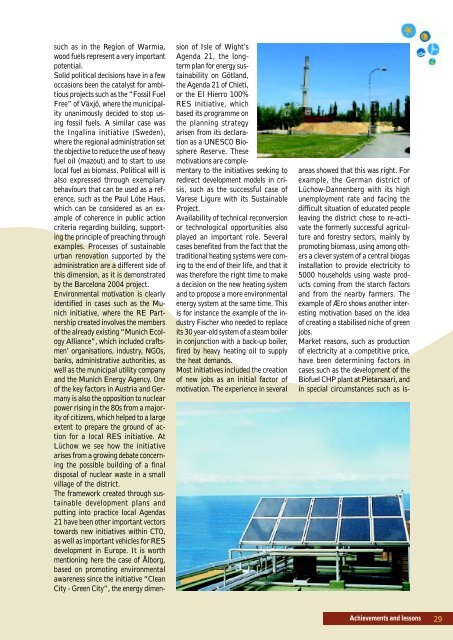

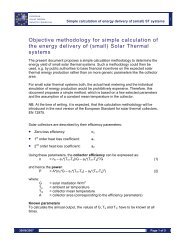
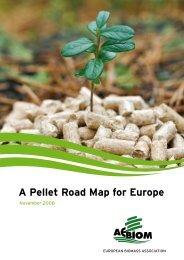
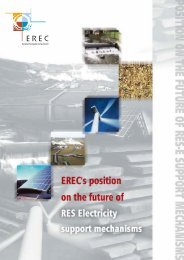
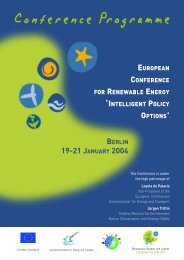
![Energy [R]evolution - Greenpeace](https://img.yumpu.com/47174859/1/184x260/energy-revolution-greenpeace.jpg?quality=85)
